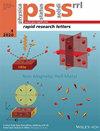氧化铁纳米粒子的磁性:从原子秩序到介观尺度的复杂性
IF 2
4区 物理与天体物理
Q3 MATERIALS SCIENCE, MULTIDISCIPLINARY
引用次数: 0
摘要
微波辅助热分解法合成了直径≈5 nm 的锌取代氧化铁纳米粒子。加入乙二醇后,粒径增加到 22 纳米。通过电子能量损失光谱-扫描透射电子显微镜观察到了阳离子紊乱。利用莫斯鲍尔光谱法结合里特维尔德分析法,确定了晶格中阳离子和空位的完整重配,以及磁矩的偏移。这样就可以计算出磁矩,并与测量结果保持良好一致。交变电流磁感应强度是通过 Néel-Brown 和 Coffey 模型来模拟的,这两种方法之间存在一些差异,我们将对此进行讨论。最大的颗粒显示出复杂的形态,涉及较小单元的定向附着机制。研究结果表明,尽管存在这些缺陷,但它们的行为与磁阻滞纳米粒子无异。本文章由计算机程序翻译,如有差异,请以英文原文为准。
Magnetism of Iron Oxide Nanoparticles: From Atomic Order to Complexity at the Mesoscopic Scale
Zn‐substituted iron oxide nanoparticles of ≈5 nm in diameter are synthetized by a microwave‐assisted thermal decomposition method. The addition of ethylene glycol results in a size increase to 22 nm. Cationic disorder has been observed by electron energy loss spectroscopy–scanning transmission electron microscopy. Using Mössbauer spectrometry combined with Rietveld analysis, the complete cationic and vacancies repartition in the lattice is determined, as well as the canting of magnetic moments. This allows the magnetic moment to be calculated, in good agreement with that measured. The alternating current magnetic susceptibility is modeled by the Néel–Brown and the Coffey models, showing some discrepancy between these two approaches which is discussed. The largest particles show a complex morphology involving an oriented attachment mechanism of smaller units. Their cationic disorder and internal porosity have been evidenced and quantified, and the work shows that despite these defects they behave rather as magnetically blocked nanoparticles.
求助全文
通过发布文献求助,成功后即可免费获取论文全文。
去求助
来源期刊

Physica Status Solidi-Rapid Research Letters
物理-材料科学:综合
CiteScore
5.20
自引率
3.60%
发文量
208
审稿时长
1.4 months
期刊介绍:
Physica status solidi (RRL) - Rapid Research Letters was designed to offer extremely fast publication times and is currently one of the fastest double peer-reviewed publication media in solid state and materials physics. Average times are 11 days from submission to first editorial decision, and 12 days from acceptance to online publication. It communicates important findings with a high degree of novelty and need for express publication, as well as other results of immediate interest to the solid-state physics and materials science community. Published Letters require approval by at least two independent reviewers.
The journal covers topics such as preparation, structure and simulation of advanced materials, theoretical and experimental investigations of the atomistic and electronic structure, optical, magnetic, superconducting, ferroelectric and other properties of solids, nanostructures and low-dimensional systems as well as device applications. Rapid Research Letters particularly invites papers from interdisciplinary and emerging new areas of research.
 求助内容:
求助内容: 应助结果提醒方式:
应助结果提醒方式:


